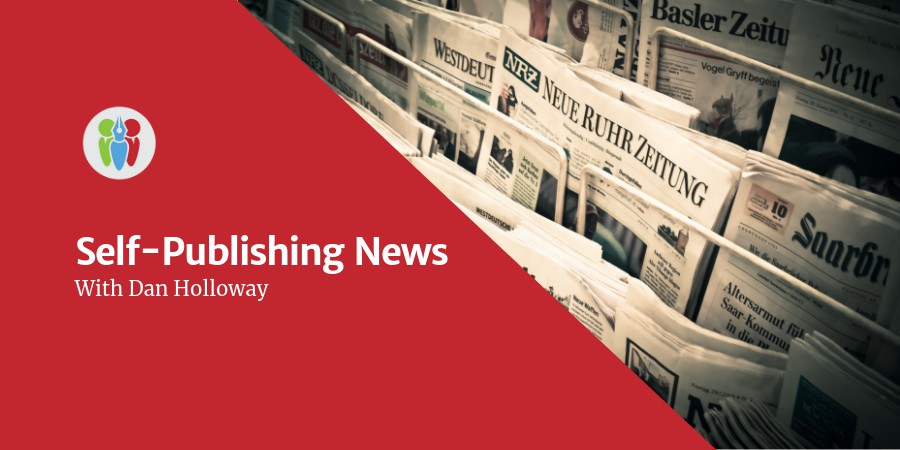
ALLi News Editor Dan Holloway
In this week's Self-Publishing News, ALLi News Editor Dan Holloway takes a look at Ingram Spark's new content guidelines and major copyright developments.
Today I gave what in theory was a talk about mental health in higher education. It turned, as so many talks do, into a seminar about storytelling. I am constantly reminded just how important our wonderful art is. If you want to change anything, it is almost impossible to do it without employing the art of storytelling along the way.
Ingram Spark Cracking Down on Dubious Content
A long news item to start our column this week, but an important one. Questionable content has been a big concern for Amazon for some time. On February 25th Ingram Spark announced new rules that aim to enable it to tackle book scams. The rules, which come into effect on April 27th, are aimed squarely at the most frequent scams. Ingram Spark is the print publisher of choice for many indies, so what this means in practice matters. Inevitably, there will be some concerns that innocent projects will be affected. The guidelines, which were sent to Ingram Spark account holders, make it very clear which types of book they are targeting.
In particular, the following are in the firing line. First are “summaries, workbooks, abbreviations, insights, or similar type content without permission from the original author.” These sit alongside “books or content that mirror/mimic popular titles” and “books that are misleading or likely to cause confusion by the buyer”. The target here is clearly that kind of book that seeks to cash in on someone else's popularity without any artistic input of the author's own. It is to be hoped that serious commentaries, especially academic notes of Cliff or York style, are not caught up.
Two additional categories of interest are “books containing blank pages exceeding ten percent, notepads, scratchpads, journals, or
similar type content” and “books created using artificial intelligence or automated processes”. The latter is clearly targeting content scrapers and scripters.
On the ALLi forum, many members expressed concern, particularly about the workbooks, notebooks and journals, so we asked ALLi Watchdog desk what the changes might mean for authors (see below) and have been in touch with Ingram in the UK and US. Director of IngramSpark, Robin Cutler, was quick to reassure us that these moves will only affect bad actors and not genuine authors and publishers.
“The use of creative AI to make content isn’t at all what we’re talking about here. Really a more correct term would be “mass-produced” content that we’re looking to weed out. Examples of this would be same interiors/different covers for hundreds and even thousands of titles. In some cases, the interiors are blank and sometimes they carry high prices. This has been a fairly recent problem by a few bad actors so that’s why we’re taking steps to remove them now.
Also, ALLi members and other indies should know in our review process we are very judicious and have no intentions to exclude content such as workbooks, notebooks that are part of a publisher or author’s original book. However, we will be carefully reviewing content designed to profit off of other author’s works. We know bogus when we see it and that’s what we’re looking to remove.”
ALLi Watchdog on Ingram Content Crackdown
John Doppler, Head of ALLi's Watchdog Desk, gives his impressions on each of the Ingram rule changes:
1. Summaries, workbooks, etc. The key phrase here is “without permission from the original author”. Clearly an attempt to crack down on trademark infringement and books that offer brief summaries of other authors' books without original content. These have flooded Amazon in the past, and they cause confusion with legitimate titles — often intentionally — due to similar titles and cover designs. Amazon's way of handling this was to require these books to include “Summary”, “Study Guide”, or “Analysis” in the title and on the cover in the same size font as the rest of the title.2. Books containing blank pages exceeding 10%. Journals and notebooks are a low-content item that some individuals have been mass-producing. KDP screens for “excessive blank pages” and will flag that as a quality issue, requiring a human screener to approve the submission. While mass-produced content is the likely here, Ingram's approach may be a point of friction, as there are people producing beautiful, thoughtfully created journals who may be caught up in this crackdown.3. Books or content that mirror/mimic popular titles, including without limiting, similar covers, cover design, title, author names, or similar type content. This is one that's causing anxiety for authors, but this appears to target blatant knock-offs of bestsellers, rather than books that share the conventions and tropes of a genre. Books that intentionally cause confusion with legitimate titles, or that tread too closely on other publishers' trademarks are the targets here: Fifty-One Shades of Grey and Chicken Soup for the Spirit. This may cause problems with parody and satirical works, however.4. Books that are misleading or likely to cause confusion by the buyer… The theme should be clear now: Ingram is cracking down on imitators, counterfeiters, and deliberately confusing presentations designed to trick readers into buying a low-quality lookalike.5. Books listed at prices not reflective of the book's market value. Because Ingram is a distributor, they don't offer a convenient way to order small quantities for personal use. It's a fairly common workaround to publish books for personal use, but to assign them ridiculous prices so that no one will buy them. Obviously, Ingram doesn't want their catalogs cluttered with non-selling titles, so they're cracking down on that practice.6. Books scanned from original versions… A no-brainer; this is simple quality control. KDP has had a policy in place for years on this, and they automatically flag OCR issues as a quality concern.7. Books created using artificial intelligence or automated processes. I'm sure that Ingram's intent here is, again, to prevent low-quality and mass-produced garbage from cluttering up their catalog. This is a wide net they're casting, but I believe only the egregious offenders will get caught up in this. Books that offer a bad experience for the consumer — those scraped from online content, or cobbled together by poorly trained or experimental AIs without human oversight — are going to get the boot. And that's as it should be. Those works that have used AI as just one step in the larger writing process (e.g., as a sort of digital ghostwriter) are going to be indistinguishable from human-authored works and are unlikely to come to Ingram's attention in the first place.
Ingram has promised to keep us updated as this issue unfolds. Watch this space.
Copyright
I am delighted to be able to report on two copyright related stories of importance for indies. First up is a fascinating paper co-authored by Rebecca Giblin of Melbourne University that takes a look at author contracts in Australia. Alongside the UK, Australia is the most prominent country not to have standard rights reversion clauses in author contracts. The new paper looks at precisely this question, drawing its findings from actual contracts provided by the Australian Society of Authors. The issue matters because one of the driving factors behind the indie revolution of the early 2010s was authors whose back catalogue had reverted to them.
Also in copyright news, a review of the Digital Millennium Copyright Act is starting. Passive Guy's post on the subject is interesting as ever, coming from his day job as a copyright lawyer. DMCA matters to indies, as he explains, because the takedown notices we most frequently associate with the Act are our go-to tool for getting pirated material removed online.
Coronavirus
It's the story that it's impossible to avoid wherever you are in the world. Coronavirus is starting to have an effect on the book world. Specifically, if you are attending one of the major book fairs coming up this year, you should watch this space. London Book Fair is still going ahead (as I type). But Bologna Children's Book Fair has already been cancelled. And bookstores in China, which has the world's highest number of stores, are in serious trouble. As public spaces are increasingly closed down, sales have dropped 90%.
I look forward to meeting many of you at London Book Fair. But obviously, we need to keep a watch on possible cancellations.
Storytel and Author Earnings
Storytel has been in the news a lot over the past year. It is leading the charge when it comes to audio subscription. It is particularly exciting to follow the progress of companies like Storytel, especially as we increasingly see a world of multiple platforms and multiple rights opening up. This week Storytel announced it has raised $96.5m in new funding. It clearly has big ambitions.
Finally, if you are missing news about libraries, do tune into my last ALLi podcast chat with Howard where we discuss the whole affair.
Ingram Spark announces new content guidelines and top #selfpub news stories for #indieauthors, in one quick read, by #ALLi News Editor Dan Holloway @agnieszkasshoes #digitaleconomy #publishingopenup Share on XOver to You
Ar you worried about print book scammers? Is it as much of a problem as with ebooks, or will rules to crack down end up being a bit of a nuisance? Let us know in the comments below.
Upcoming Conferences and Events
FEBRUARY 2020
Pubwest, 20-22 Feb [Portland, Oregon]
MARCH 2020
London Book Fair, 10-12 Mar [London]
APRIL 2020
Self-publishing Conference, 25 Apr [University of Leicester] Short story course, 2 Apr – Sep (6 workshops) [London]
AUGUST 2020
Self-publishing Live, 14-16 Aug [Chicago]
SEPTEMBER 2020
DigitalBookWorld, 14-16 Sep [Nashville]





I had my title rejected for the automated and Ai produce content rule. Only thing is my book is 400 pages, I spent 300+ hours creating it, wrote every single word over the lat 6 months. Do you know how annoying it is to have to submit an appeal in this case? Only thing I can think of is that the interior design I used was cheap as I want it to get on pre-sale quick while I get the interior professional designed (a longer process). But it’s most definitely not an egregious violation and 0% created by AI. On top of that I already have 4-books in their system, one of which sold 50,000 copies and this new book is similar to that one!
Hey, ALLi gang, great piece!
Double back around to IngramSpark’s updated FAQs. They loosened up a bit on the blank content guidelines from 10% to 90-100%. I interviewed Robin Cutler 2 days ago and she confirmed the less strict guidelines. But, she did go on to clarify repetitious content and mass uploads were a no-go.
Keep up the excellent work!
-Dale L. Roberts